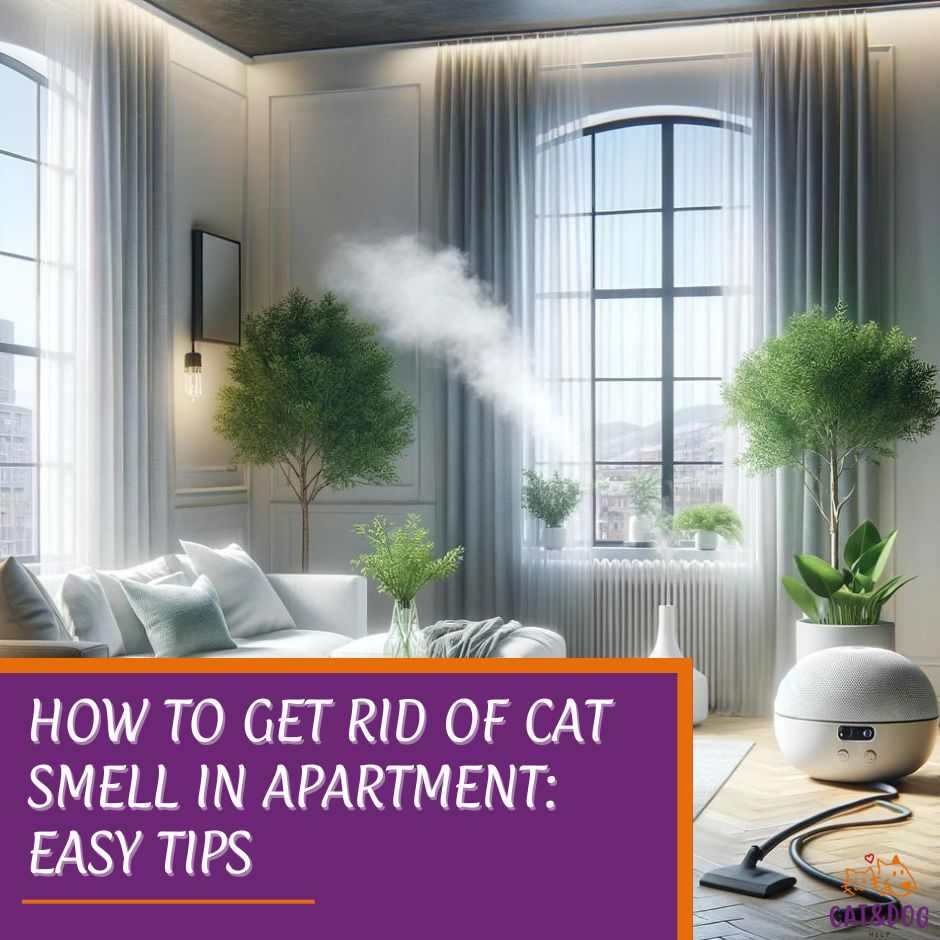How to get rid of the cat smell in the apartment? Let’s freshen up your space effectively with our tips here.
Living with a furry friend in an apartment can bring joy and companionship, but it can also introduce a less pleasant side effect: the lingering scent of cat odor.
Whether it’s due to litter boxes, accidents, or the natural odor from your cat’s coat, these smells can permeate your living space, leading to a less-than-fresh environment.
Addressing these odors quickly and efficiently is key to maintaining a comfortable home where both you and your fluffy companion can thrive.
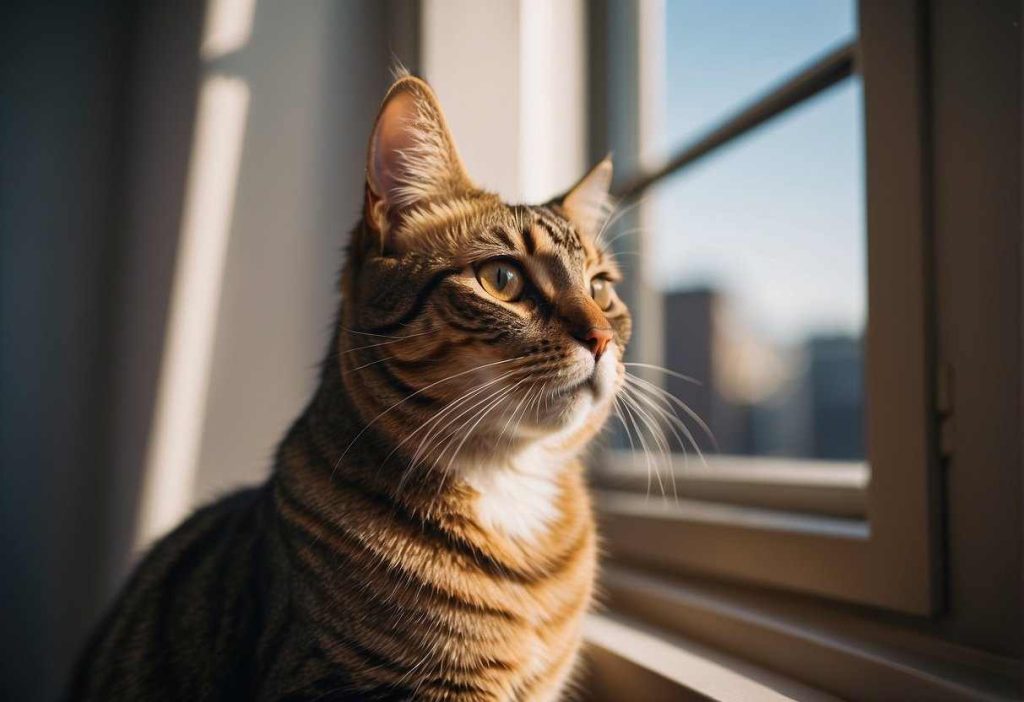
No one enjoys the unwanted aroma of cat smell in their home, so getting rid of it is important for creating a pleasant living atmosphere and preserving air quality.
The truth is, the longer you let the odors sit, the more they seep into fabrics and furnishings, making them harder to remove.
Plus, there’s the added consideration of health: lingering odors may carry bacteria that could affect both your and your pet’s well-being. It’s not just about the smell—your health could be on the line, too.
Key Takeaways
- Target cat odors at their source for effective removal.
- Maintain a routine cleaning schedule to prevent odor buildup.
- Improve air quality by addressing cat smells promptly.
How to Get Rid of Cat Smell in Apartment: Step-by-Step Guide
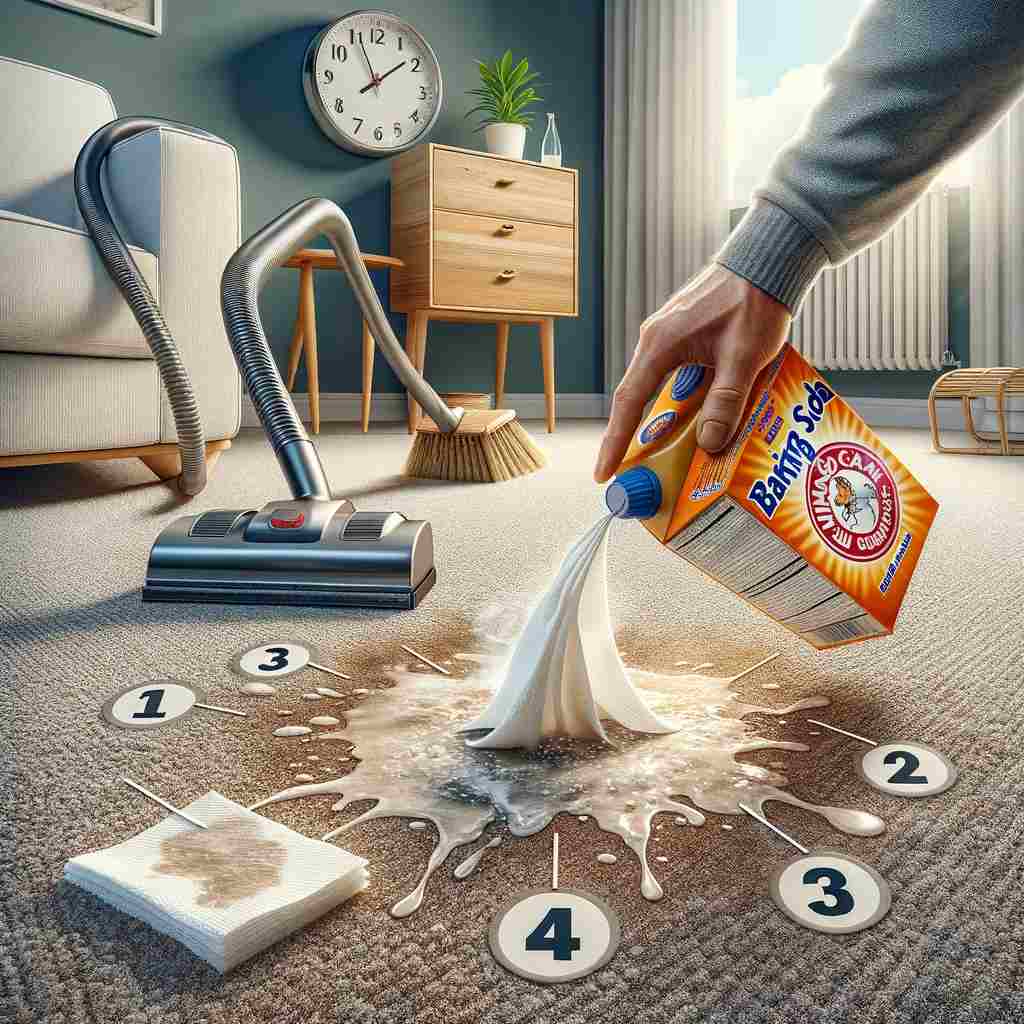
Immediate Actions for Fresh Accidents:
You know the drill — you’ve found a fresh “present” from your furry friend. Let’s jump right in!
- Blot, don’t rub: Quickly blot up as much of the urine, vomit, or feces with paper towels. Avoid rubbing to prevent the spreading of the substance.
- Apply Baking Soda: Liberally sprinkle baking soda over the area to soak up moisture and neutralize acid. Wait 15 minutes, then vacuum it up.
- Vinegar Solution: Mix equal parts white vinegar and water in a spray bottle. Spritz on the spot and let sit for a few minutes. Blot again with a clean towel.
Deep Cleaning for Persistent Odors:
Older smells tend to stick around like that one guest who won’t leave your party. Here’s how to show them the door:
- Carpet and Upholstery:
- Enzyme Cleaners: These are your best friends. Apply according to the directions on the bottle, usually letting it sit before a thorough blotting.
- Hydrogen Peroxide Mixture: Mix hydrogen peroxide with water (test for colorfastness), spray on the stain, wait five minutes, and then dab away.
- Hard Surfaces and Walls:
- Scrub with your vinegar solution. For tougher spots, a paste of baking soda and water can be applied, left to set, and then scrubbed clean.
Throughout the process, keep windows open for good ventilation, and maybe add a little humor by thanking your cat for keeping you on your toes — yeah, right!
Remember, consistency is key, and you’ll have a fresh-smelling apartment in no time!
Preventing Future Odors
Have you ever thought about what it takes to keep your living space as fresh as a daisy, even with your furry friends around? It’s all about staying one step ahead! Let’s break it down into some simple steps.
Litter Box Best Practices First things first, let’s chat about the litter box:
- Location: Place it in a well-ventilated area to discourage stagnant smells.
- Cleaning Routine: Scoop daily, fully replace the litter weekly, and consider a deep clean of the box every month.
A clean litter box means a happy cat and a fresher-smelling apartment, don’t you think?
Regular Cleaning and Grooming Now, for your feline’s personal hygiene and living spaces:
- Grooming Schedule: Regular brushing reduces dander and hair, both of which can contribute to unwanted odors.
- Cleaning Plan: Vacuum at least twice a week and mop hard surfaces to pick up any stray fur or dander.
Don’t you love the idea of snuggling up with a clean, fluffy kitty?
Diet and Health Management Lastly, did you know that what goes into your cat is just as important as cleaning up after them?
- Healthy Diet: A balanced diet can reduce the odor of your cat’s waste.
- Veterinary Check-ups: Keep up with annual health checks to prevent issues that might cause stinks.
Remember, a healthy cat is often a less smelly cat!
How to Get Rid of Cat Smell in Apartment: Identifying the Source of Cat Odors
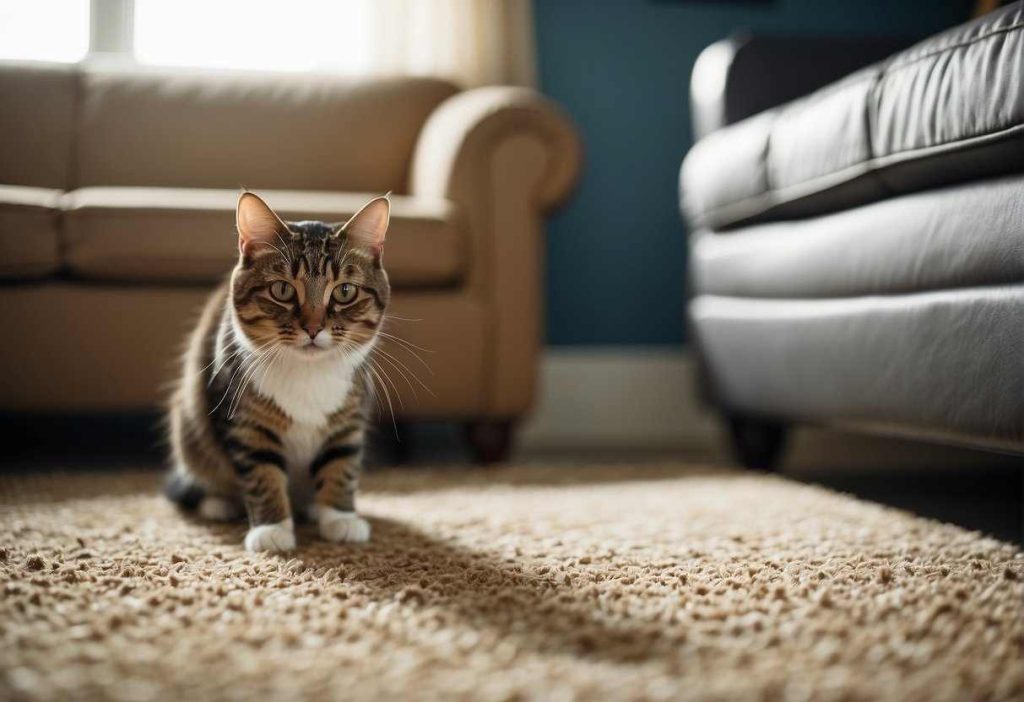
Common Causes of Cat Smells
- Urine: The most notorious of them all, cat pee packs a punch with its persistence. (1)
- Feces: A litter box that isn’t cleaned regularly can become quite the stink bomb. (2)
- Vomit: Unexpected but natural, these messes need quick attention. (3)
- Dander: Invisible but mighty, dander can cause odors and allergies.
Have you spotted the usual trouble spots but the smell is still playing hide-and-seek? Grab a blacklight during the evening, and those hidden stains will light up like a neon dance party.
Tools for Detecting Odors
- Blacklight: Shines a light on urine and other bio-based stains.
- Nose: Trusted and true, nothing beats a good ol’ sniff test.
- Visual Inspection: Keep an eye out for discoloration and spots on carpets and furniture.
Remember, the key to a nose-happy home is staying on top of these odor culprits. Regular check-ins with your litter box and cleaning routine will work wonders.
Comprehensive Solutions and Insights
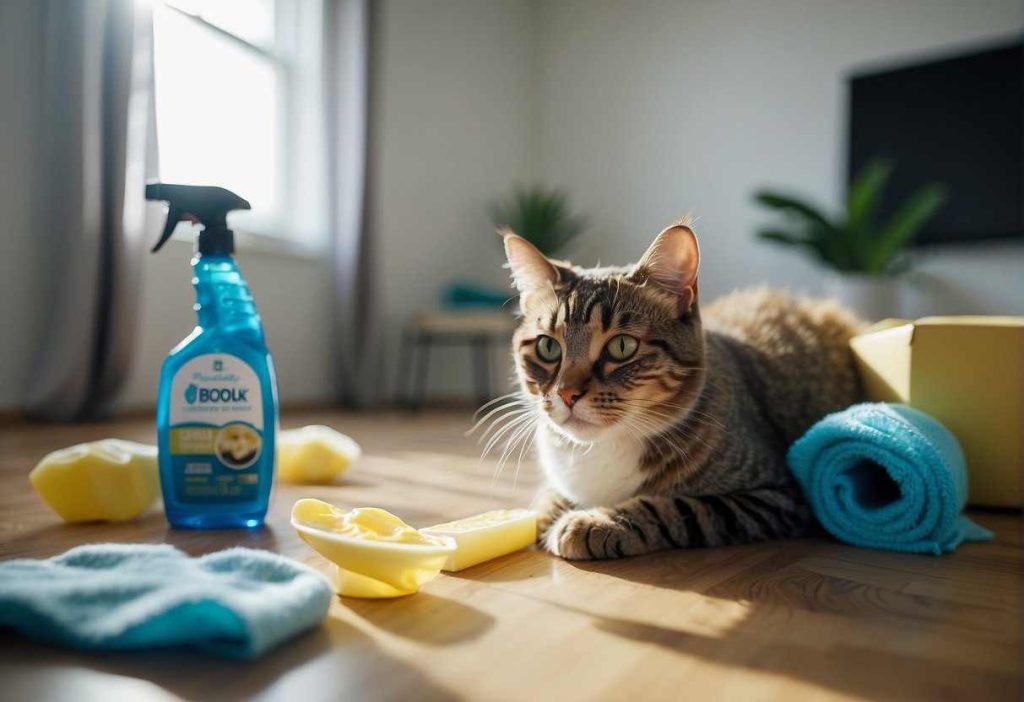
Here’s a quick guide to help you freshen up your space.
Advanced Odor Removal Techniques
Do you have some stubborn odors that just won’t quit? Enzymatic cleaners are your new best friends. (4)
These specialized solutions break down the tough molecules found in cat urine and vomit, neutralizing the smell entirely.
Remember, regular soap may leave things clean to the eye, but it won’t always win the battle against odors.
Understanding and Mitigating the Root Causes
Why do these smells seem so relentless? Cat odors, especially urine, have a complex chemical structure that likes to linger.
Look for behavioral issues or medical concerns, as these can increase the frequency and intensity of accidents. (5)
Addressing the root cause is crucial; ensure your kitty is happy and healthy to prevent future mishaps.
Cost-Effective and DIY Solutions
Who doesn’t love a good budget-friendly hack? Unleash the power of everyday items to combat odors:
- Baking Soda: Sprinkle it on carpets and furniture, then vacuum it up after a few hours. (6)
- Vinegar: A natural deodorizer, dilute it with water and use it to clean surfaces.
- Hydrogen Peroxide: Mildly antiseptic, it can help with spot cleaning. Just be sure to test for colorfastness first!
Remember to vacuum frequently and keep up with regular dusting and cleaning. Increased ventilation and proper litter box maintenance go a long way in keeping that fresh home vibe.
And don’t forget to clean your cat’s bed and toys regularly. With these easy yet effective solutions, say goodbye to the unwanted whiff and hello to a fresh, cozy apartment.
Preparing to Eliminate
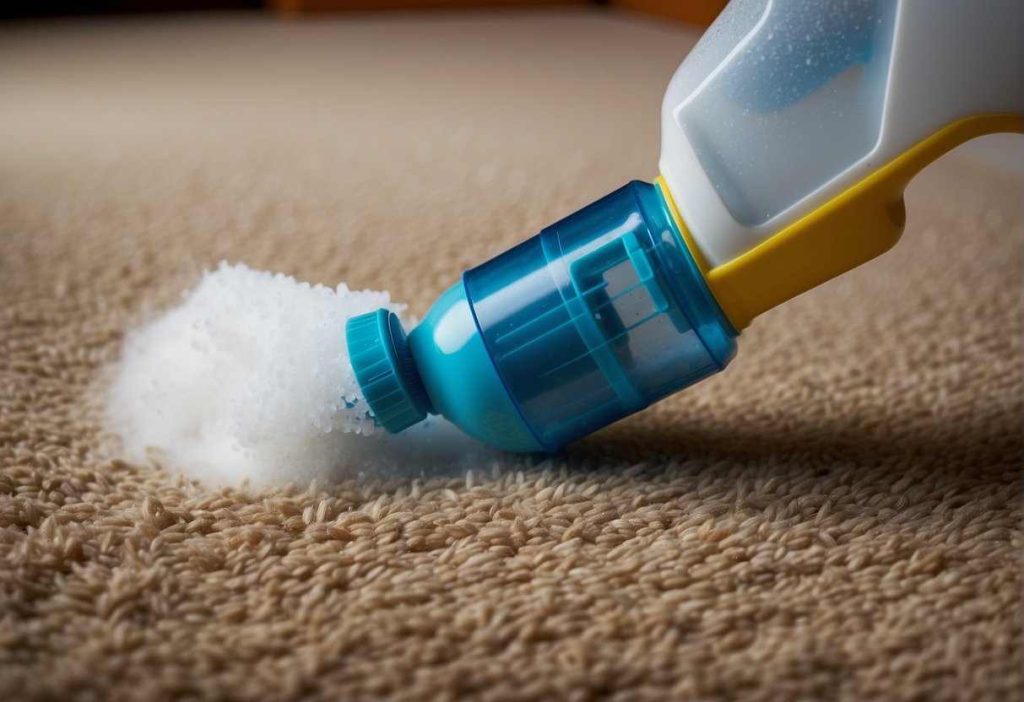
Gathering Necessary Supplies
Before diving into battle against the smell, stock your arsenal with these trusty tools:
- Baking Soda: Your go-to odor neutralizer.
- White Vinegar: A natural deodorizer that’s also economical. (7)
- Enzymatic Cleaners: They break down the odor-causing proteins.
- Hydrogen Peroxide: A disinfectant that’s effective yet gentle. (8)
And if you’re rooting for Team Earth, consider eco-friendly alternatives like lemon juice or essential oils mixed with water.
Safety First: Protecting Your Pets and Yourself
We all want our furry friends safe and sound. Ensure the cleaning agents you choose are non-toxic because our curious companions have a knack for sniffing out the weirdest things!
Always read labels and, when in doubt, a quick internet search or chat with your vet can offer peace of mind.
- Non-Toxic Check: Go for products marked pet-friendly.
- Ventilation: Open those windows to keep the air moving.
Ready? Great! Now spill the catnip, and let’s de-smellify your space! Remember, a sprinkle here and a dab there can make a world of difference.
Stay tuned for the next steps where we’ll mad scientist our way to a fresher-smelling abode.
Air Quality Improvement
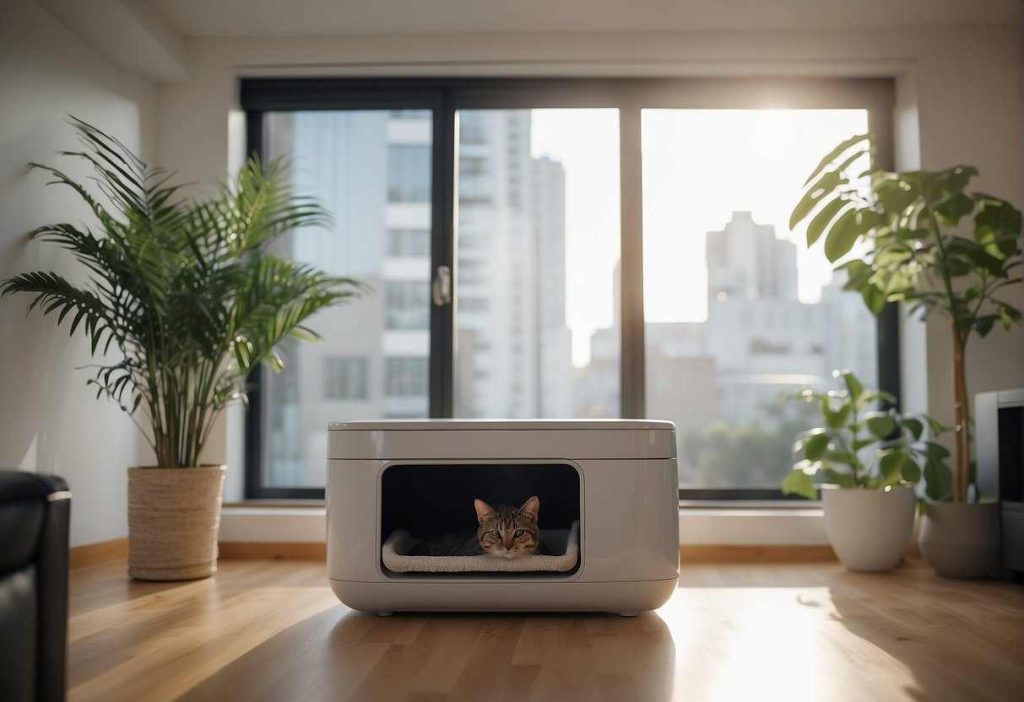
Let’s dive into a couple of game-changers: increasing ventilation and harnessing the power of air purifiers.
First up, let’s talk airflow. Have you tried the open-window approach? It’s potentially the easiest way to usher out odors and let in the fresh air.
If privacy or weather is a concern, even cracking windows slightly can make a substantial difference.
Here’s a quick table to make it fun:
| If… | Then… |
|---|---|
| It’s sunny? | Open those curtains wide and let the sunlight work its magic! |
| It’s breezy? | Ace! A natural airflow can shuffle those odors right out the door. |
| It’s just not feasible? | No problem—let’s explore some indoor options for cleaner air down below. |
And don’t forget fans! Ceiling or portable fans help to keep the air moving, proving that sometimes the best solutions are also the simplest.
Moving on, air purifiers can be your best friend in the fight against that stubborn cat smell. They work tirelessly to clean the air for you and your furry friend. Look for purifiers with:
- HEPA filters to trap dander and dust particles.
- Activated carbon filters to neutralize odors.
Remember, when choosing an air purifier, size matters. Ensure it’s fit for the size of your room for optimal efficiency.
Got all that? By combining good ventilation with the technology of air purifiers, your apartment will smell fresh in a flash. Keep these tips in your back pocket and enjoy your newly revitalized living space!
Quick Recap

Key Takeaways for Cat Owners:
You’ve got all the tricks up your sleeve now to battle that stubborn cat odor, haven’t you? Let’s ensure your furry friend’s scent doesn’t outstay its welcome:
- Acting Fast: Spotted a new accident? Quick, grab some supplies and tackle it before it sets in.
- Enzyme Cleaners: Regular soap won’t always cut it. Break down those smells on a molecular level with enzyme cleaners.
- Regular Cleaning: Turn regular vacuuming and spot cleaning of furniture into your new habit.
Commitment to a Clean, Odor-Free Home:
Consistency is your best friend when it comes to keeping your apartment smelling as fresh as a daisy:
- Immediate Action: Tackle urine, vomit, or spills right away.
- Deep Clean: Include hidden nooks and furniture in your cleaning sprees.
Encouragement for ongoing diligence in cleaning and health monitoring:
Keeping an eye out for your cat’s health can prevent accidents. And remember to maintain that litter box!
A clean home is a happy home – for both you and your whiskered roommate! Keep sniffing out those odors and knocking them out!
Frequently Asked Questions
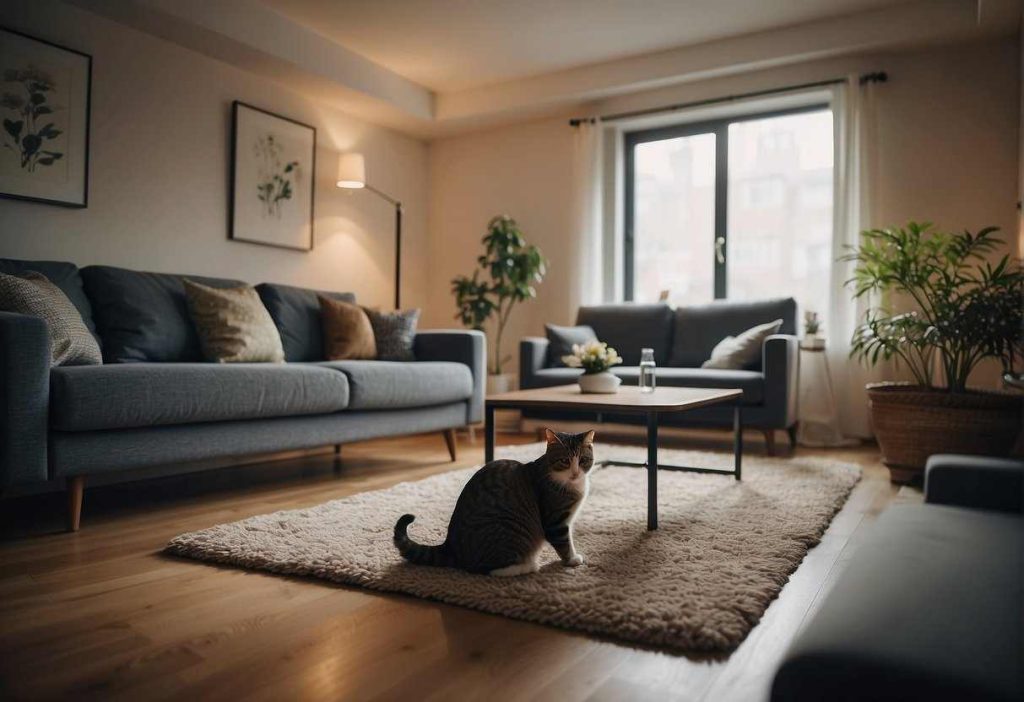
Dealing with cat odors can be a bit challenging, right? Well, if you’re wondering about the quickest fixes, natural alternatives, or if tech gadgets like air purifiers work, you’ve come to the right spot.
Here’s a quick dive into some FAQs to help you keep your apartment smelling fresh.
What’s the fastest way to remove the cat urine smell from my apartment?
The fastest way to tackle that strong cat urine odor is to act immediately.
Blot up the urine with paper towels if the spot is fresh, then cleanse the area with an enzymatic cleaner specifically designed for pet odors.
This breaks down the urine components to neutralize the smell.
Can I use vinegar to neutralize cat odors, and how?
Absolutely, vinegar is a great home remedy. Mix white vinegar with equal parts water and spray it on the affected area.
Let it sit for a bit and then wipe it up. The vinegar naturally combats the ammonia smell in cat urine.
What are some natural solutions for eradicating cat odors in my home?
Natural solutions include baking soda, which you can sprinkle on carpets before vacuuming, and charcoal air-purifying bags that absorb odors.
Additionally, keeping windows open for proper ventilation can help remove lingering smells.
How often should I clean my cat’s litter box to prevent odors?
Ideally, scoop the litter box once or twice a day, and do a complete change of litter once a week. Regular scooping keeps odors at bay and makes your cat happy too!
How often should I clean my cat’s litter box to prevent odors?
Ideally, scoop the litter box once or twice a day, and do a complete change of litter once a week. Regular scooping keeps odors at bay and makes your cat happy too!
Are air purifiers effective against cat smells, and what type should I get?
Yes, air purifiers can be effective, especially those with HEPA filters and activated carbon. These can capture dander and neutralize odors.
Just make sure the model you choose is suitable for the size of your room.
What are some safe, pet-friendly cleaning products for cat odors?
Look for non-toxic cleaners that list pet safety on their labels. Enzymatic cleaners are particularly effective and safe around your furry friends.
Also, products with natural ingredients like citrus or essential oils can freshen the air without harming your pet.
Is it necessary to hire professional cleaners for cat odor removal?
Not always, but if the smell persists despite your cleaning efforts, calling in professionals who specialize in pet odors can be a good last resort.
They have the expertise and equipment to handle deep-set odors.

